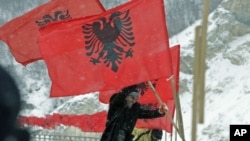It has now been four years since the former Serbian province of Kosovo declared its independence. The country has made progress in that time, but major challenges remain, including establishing stability, extending government authority throughout the territory, and improving the economy. The relationship with Serbia - which has not recognized the independence of its former province - is at the core of these challenges.
When Prime Minister Hashim Thaci read Kosovo's declaration of independence, in 2008, there were fears that independence would have destabilizing effects on the region. So far, those have not materialized.
Former diplomat Morton Abramowitz, at the Century Foundation, said there has been positive progress toward state and institution building. But he said other problems will not be solved any time soon, including the situation in the Serbian-populated North.
“The North is not going to be resolved in any short time period. The EU [European Union] plays with it, the Americans are sort of out, Kosovo depends on the foreigners to resolve the problem, and the Serbs are unable to come to grips with the loss of Kosovo,” said Abramowitz.
Since July, for example, Serbs along Kosovo's border with Serbia have been setting up roadblocks - after Kosovo's ethnic Albanian-dominated government tried to take control of the border region, which is under de-facto Serb rule.
The events reopened discussions on the status of that area and have disrupted bilateral talks on technical issues between Belgrade and Prishtina.
“The one good thing about the recent dust-up is that the Kosovo government has made it clear, or has been effective, in getting the West to recognize that the North is part of Kosovo and that has been a significant achievement," said Abramowitz.
It also has affected Serbia's chances to join the European Union.
To date, the lack of progress in relationships with Kosovo, has marred Belgrade’s prospects. But Serbia's domestic political situation, with elections coming up in the spring, makes it more difficult for Belgrade to do anything that could alienate those voters who still consider Kosovo as part of Serbia.
Eighty-seven countries, including the United States, have recognized Kosovo’s independence. But Serbia claims the move is illegal and is supported by Russia, a permanent U.N. Security Council member with veto power.
The European Union itself is divided with five of its members not recognizing independence. Alex Grigorev, of the Council for Inclusive Governance, said Kosovo has to work to convince these countries, no matter what else happens.
“Because I do not see any future for Kosovo without membership into the European Union, and those five members have to be worked on,” said Grigorev.
There are other problems besides relations with Serbia. Unemployment is at 45 percent. There is pervasive corruption. Also, war crimes investigations against high-profile public figures have been marred by reports of witness intimidation.
By and large, though, peace in the region has been preserved.
And in another sign of progress, the country now has its first female President, Atifete Jahjaga.
In fact, the International Steering Group for Kosovo, a 25-member body overseeing its progress, says the supervised phase of independence may end as early as December.










